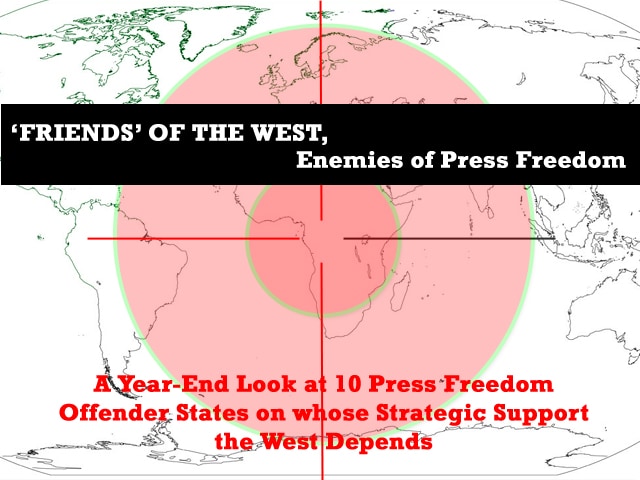
Freedom House survey highlights significance of Arab uprisings
In its annual survey of political rights and civil liberties, the organisation concluded that even as the Arab Spring triggered unprecedented progress, it also provoked a backlash, repercussion of which have been felt across the Middle East, Eurasia and Africa.

Fundamedios records 156 aggressions against the media in 2011
According to the records, most of the aggressions were initiated by public officials; 18.59% of these by the President.

IPI reports on deadly trends for journalists in 2011
Of the 103 journalists killed in 2011 because of their work, 36 lost their lives in Latin America, confirming a trend of increasing violence against journalists in the Western hemisphere that IPI and other international groups have sought to address for some years.

The Arab world is the most dangerous region for journalists, says WAN-IFRA
According to the organisation’s annual report, 64 journalists and other media workers were killed world-wide because of their professional activities in 2011, with nearly half of them killed in Pakistan, Iraq, Libya and Yemen.

Decriminalisation of press offences a major issue in 2012
Decriminalization is urgent in Peru, where a promising reform of the criminal code approved in July 2011 has not yet been enacted.

IFJ presses UN for action on media killings after violence claims 106 lives of journalists and media staff in 2011
IFJ blames governments’ failure to uphold their international obligations for the ongoing violence targeting media.

IAPA reviews state of press freedom in 2011
IAPA concluded that this was one of the most “challenging and tragic” years for the countries of the Americas and reaffirmed its commitment to confront the next challenges.

IPI reviews 10 states with poor press freedom records, on whose strategic support the West depends
In “‘Friends’ of the West, enemies of press freedom”, IPI highlights the press freedom situations in Turkey, Azerbaijan, Ethiopia, Saudi Arabia, Uzbekistan, Turkmenistan, Kazakhstan, Afghanistan, Pakistan and Hungary.

RSF annual overview: 10 most dangerous places for journalists
The Arab Spring and protests in other countries were responsible for a dramatic surge in the number of arrests, from 535 in 2010 to 1,044 in 2011.

Unrest and impunity drive journalist deaths in 2011, according to CPJ’s year-end survey
Political conflict and unrest proved deadly for journalists in 2011, while governments failed to prosecute those who targeted reporters for their work.

Crackdown on human rights defenders: seeds of repression planted in year of revolution
In new report, CIHRS hails the courageous work of human rights defenders in the region who were locomotives for change in 2011.

Number of journalists in prison reaches 15-year high
Iran, Eritrea and China are among the leading jailers, according to CPJ’s annual census; nearly half of those held were online journalists, while about 45 percent of the imprisoned were freelancers.

Media in the eye of the storm as revolutions sweep the Arab world
In its report, RSF examines the methods used by the authorities to strangle the flow of information during popular uprisings in six countries – Tunisia, Egypt, Libya, Bahrain, Syria and Yemen.

IPI report surveys the consequences of impunity
“Impunity is a particularly difficult evil to counter because it is self-reinforcing,” says the report.

WAJA World Press Freedom Day statement
WAJA stands in solidarity with fallen colleagues in the region and victims of threats, harassment and legal intimidation in Côte d’Ivoire, Togo, Sierra Leone and Senegal.

IFJ supports photojournalists’ fight against arbitrary ban in London
London-based photographers staged a Flashmob outside City Hall to denounce arbitrary restrictions on their work in a city where the banning of photography in many public spaces is enforced by private security guards.